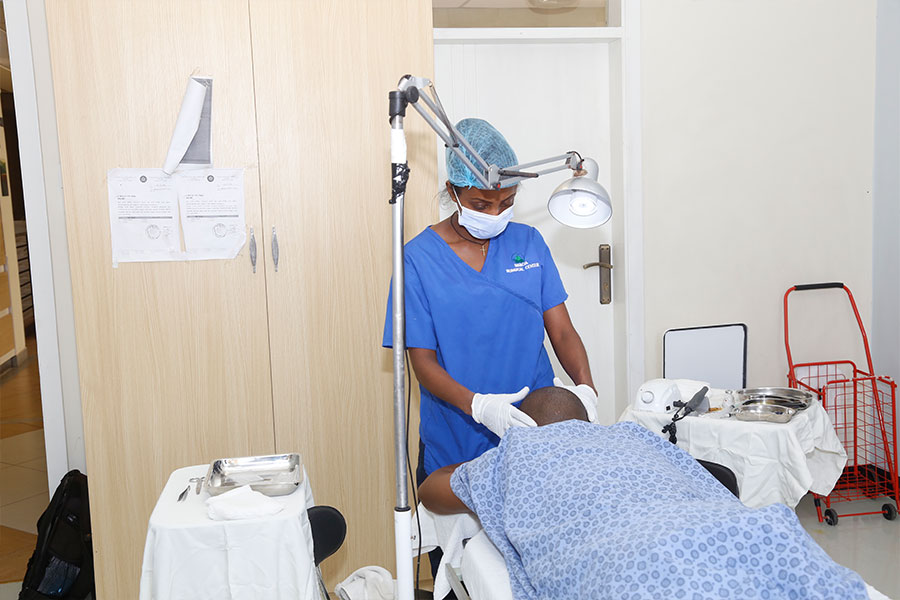
Advertorials | Feb 26,2024
Hana Tadele, a housewife and a mother of two children, lives in an apartment next to Hilton Hotel on Menelik II Avenue. Owned by the Federal Housing Corporation, the apartment has 82 housing units including Hana's.
Due to the small sizes of the rooms, her family does not have enough space to move around freely.
“If we have guests staying over, some of us are forced to sleep on the sofa,” she said.
Lately, from her friends, she heard that there is a company that makes furniture specially designed for condominium houses that saves space by performing multiple functions.
Then she visited the store of Mesfin Ashenafi Engineering Workshop, a company that is located in Saris in front of Buna Board and produces household furniture that saves space including sofa beds, bunk beds, shelves, dining tables and shoe racks.
Eight months ago, she bought a bunk bed for her children, and it saved space in the apartment, because it converts into a table during the daytime and into a bed at night.
“Now, we have a wider salon," said Hana, comparing the previous room with this one.
The company that supplied the product to Hana is founded by Mesfin Ashenafi, who has been in the furniture industry for three decades.
He founded the company 13 years ago and currently operates with ten workers. On average, 10 customers visit his workshop every day.
Geremew Tesfaye , a wood worker, builds a sofa with an extra compartment at a workshop near Gotera Condominium.
The prices at his workshop differ depending on their sizes. He sells the sofa bed and the bunk bed for 26,000 Br and 18,000 Br, respectively.
Mesfin makes beds that can be turned into tables, beds that can be used to store children's toys, and study room furniture that does not take up much space and can easily be put away once they have served their purpose. A bunk bed can store different household equipment during the day, allowing free floor space.
"We've got a plan to open a showroom in four different parts of the capital to address the working space problem that we face," said Mesfin.
Most of Mesfin's potential customers are those who live in condominiums and apartments and are interested in buying space-saving furniture.
Workneh Tekele, a father of one, is one of the random visitors at Mesfin's workshop around midday on September 4, 2019.
Workneh, who has lived in a condominium in Jemo for five years, is engaged in private business. After visiting the workshop, he was surprised by the features of the products, especially by the sofa bed and the bunk bed.
"Unlike a regular sofa, which is limited to living rooms, you can use the sofa bed for multiple purposes," he said. "These kinds of furniture came up with a storage solution allowing you to store your belongings and excess items in an organised way."
Because of the increasing price of house rent, he is planning to move into a one- bedroom condominium, leaving the two-bedroom he currently rents.
"It is even easier to pack when you move out of your house," he said. "I bought the sofa I have now seven years ago, but after seeing these products I have a plan to change most of my furniture in a short time."
Most furniture products imported into Africa are from Turkey, China, the United States, Germany, France, the United Kingdom and Canada, the leading producers of furniture products.
Geremew Tesfaye, who is in his late 20s and was born and raised in Addis Abeba, Kirkos District, is another producer of house furniture at his workshop around Qera Condominium Site.
He was a second-year machine drive department student at Tegbareid TVET College before he dropped out after seeing the increasing demand for furniture products and joined the sector.
Seven years ago, Geremew started his business alone, but after seeing the profitability of the company, he re-established the workshop under the name Fasil & Terefe Workshop with his four friends six months ago.
Geremew, who buys the raw materials from Piassa and Merkato, manufactures tables, windows, chairs, beds, doors and shelves.
“We take orders from customers to produce tailor-made furniture according to their needs," he said. "Though we have a lot of customers who live in condominiums, they are not the only ones who buy our products."
Geremew, who takes three orders a week on average, sells beds ranging between 7,000 Br to 15,000 Br and produces a sofa bed for 10 customers every three months.
"Our main challenge is, we don't have a showroom for our products," he said.
The country is importing nearly half of its current industrial wood demand, spending approximately 124 million dollars a year, according to the National Forest Sector Development Programme.
Wooden materials dominate the global furniture industry, accounting for around 65pc in 2017. The demand for furniture in Africa is rising due to growing population, urbanisation and a rise in purchasing power.
Africa accounts for about 2.2pc of the global consumption of furniture and about 2.8pc of the worldwide furniture trade, with net imports at 2.5 billion dollars. Furniture production in Africa and the Middle East is growing by 15pc on average.
The leading furniture producer is China, with 39pc of the world's furniture production. Other major furniture manufacturing countries are the United States, Germany, Italy, India, Poland, Japan, Vietnam, the United Kingdom and Canada.
Total furniture production in the world was valued at 430 billion dollars in 2017, according to the World Furniture Outlook.
The world’s top 100 furniture producing countries account for 90pc of world furniture production and 95pc of the world's GDP.
The furniture trade, at 140 billion dollars, accounted for one percent of total global business.
An expert believes that urbanisation, lifestyle changes and market demand increased the demand for innovative products in the country to save as much space as they can.
Local furniture manufacturers should consider the demand of the customers to be able to compete with imported products by ensuring the quality of their products, according to Mulugeta G.Medhin (PhD), a lecturer at Addis Abeba University's School of Commerce.
"To solve the problem of space and to promote small and micro-enterprises, the government has to support manufacturers of these products by providing sheds at one place like an industrial park, according to the expert.
"The country has a huge resource for manufacturing furniture products and utilising this resource will help to save forex," Mulugeta said.
PUBLISHED ON
Sep 07,2019 [ VOL
20 , NO
1010]

Advertorials | Feb 26,2024

Radar | Apr 27,2025

Viewpoints | Jun 05,2021

Viewpoints | Jan 22,2022

Fortune News | Dec 14,2019

Radar | Apr 27,2025

Fortune News | Oct 03,2020

Featured | Jan 03,2021

Radar | Apr 30,2021

Viewpoints | Mar 11,2023

Dec 22 , 2024 . By TIZITA SHEWAFERAW
Charged with transforming colossal state-owned enterprises into modern and competitiv...

Aug 18 , 2024 . By AKSAH ITALO
Although predictable Yonas Zerihun's job in the ride-hailing service is not immune to...

Jul 28 , 2024 . By TIZITA SHEWAFERAW
Unhabitual, perhaps too many, Samuel Gebreyohannes, 38, used to occasionally enjoy a couple of beers at breakfast. However, he recently swit...

Jul 13 , 2024 . By AKSAH ITALO
Investors who rely on tractors, trucks, and field vehicles for commuting, transporting commodities, and f...

Jun 28 , 2025
Meseret Damtie, the assertive auditor general, has never been shy about naming names...

Jun 21 , 2025
A well-worn adage says, “Budget is not destiny, but it is direction.” Examining t...

Jun 14 , 2025
Yet again, the Horn of Africa is bracing for trouble. A region already frayed by wars...

Jun 7 , 2025
Few promises shine brighter in Addis Abeba than the pledge of a roof for every family...